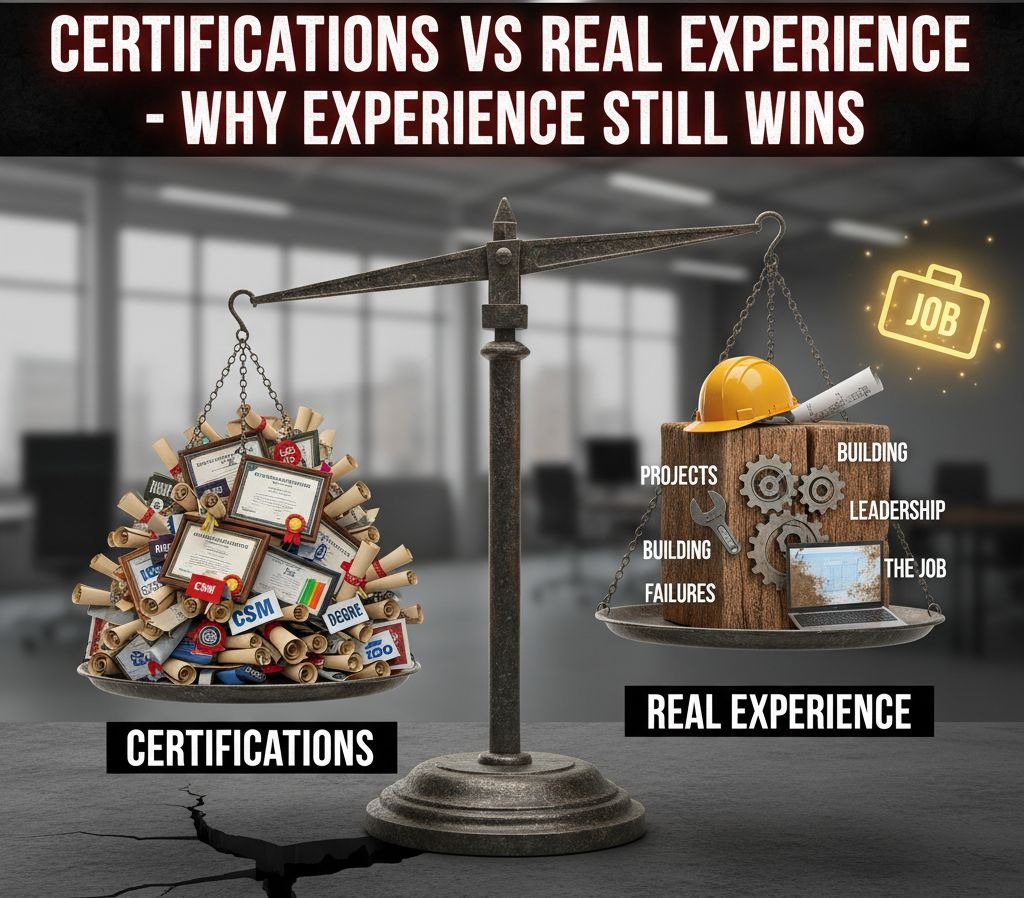Certifications vs. Real Skills: Why Experience Still Wins
In today’s world of digital badges and online certificates, it’s easy to think more certifications mean more competence. But real-world experience still carries the greatest weight. In this post, we explore why hands-on skills, adaptability, and results outshine paper qualifications — and how to find the right balance between learning and doing.
Benjamin Etanuvwoma
10/9/20252 min read


In today’s career world, certifications are everywhere. Scroll through LinkedIn, and you’ll see people celebrating new badges, digital certificates, or online course completions almost every day. It’s easy to feel like certifications have become the new currency of competence.
But here’s the truth — while certifications can help, real job skills and hands-on experience still matter far more. Let’s break down why there’s so much hype around certifications, and why experience ultimately carries greater weight.
💥 Why Certifications Are So Hyped
Quick Proof of Knowledge
In a world flooded with job applications, certifications offer a fast way for employers to gauge a candidate’s level of understanding. It’s an instant signal that says, “I’ve studied this.” For recruiters who don’t have time to dig deep, that can make a big difference.Used as a Screening Tool
Many HR systems filter candidates based on specific keywords — and certifications often serve as those keywords. If you don’t have them, your CV might not even make it to the hiring manager.Marketing and Industry Influence
Training organizations and tech giants (like Google, AWS, and Microsoft) promote certifications because it strengthens their ecosystems. The more certified professionals they have, the more their tools and platforms spread.Confidence Booster for Beginners
For newcomers entering a field, certifications offer structure and confidence. They provide a starting point and can make you feel like you belong in the space you’re trying to grow into.
🧠 Why Real Skills and Experience Matter More
Execution Is Everything
You can hold ten certificates and still struggle to perform on the job. Employers value those who can apply knowledge — who can troubleshoot, adapt, and get results under real conditions.Reality Checks in Interviews
During interviews, practical questions or test tasks quickly reveal who can do the job versus who just studied for it. That’s why candidates with hands-on experience stand out every time.Technology Evolves Too Fast
Certifications can become outdated within a year or two. But if you’ve built skills through projects and real challenges, you’ve also learned how to keep learning — which is what employers truly need.A Portfolio Speaks Louder Than a Certificate
A working demo, GitHub repository, case study, or documented success story tells your story much more powerfully than a digital badge ever could.
⚖️ Finding the Right Balance
That’s not to say certifications are useless — they can be great supplements to your skill set. A well-chosen certification can open doors, especially if you’re switching careers or entering a new industry. But once you’re through the door, it’s your skills, adaptability, and results that keep you inside.
The ideal approach?
👉 Learn deeply. Build projects. Get experience.
Then, use certifications strategically to validate what you already know — not as your only evidence of competence.
💡 My Final Thought
In the long run, employers, clients, and collaborators will remember what you did, not what you passed. Certificates may open opportunities, but experience builds credibility.
So, if you’re deciding where to invest your time — spend it mastering real skills, creating results, and gaining experience. The paper is just a tool; you are the value.
Join the Conversation
Everyone’s career journey is different — but the value of real skills never fades. Share this article with a friend or colleague who’s building their path and deciding where to focus next.
Want more insights like this? Follow Etas Global on our YouTube, LinkedIn, X, Instagram and TikTok channels for practical career tips, tech growth insights, and learning strategies that actually work.
